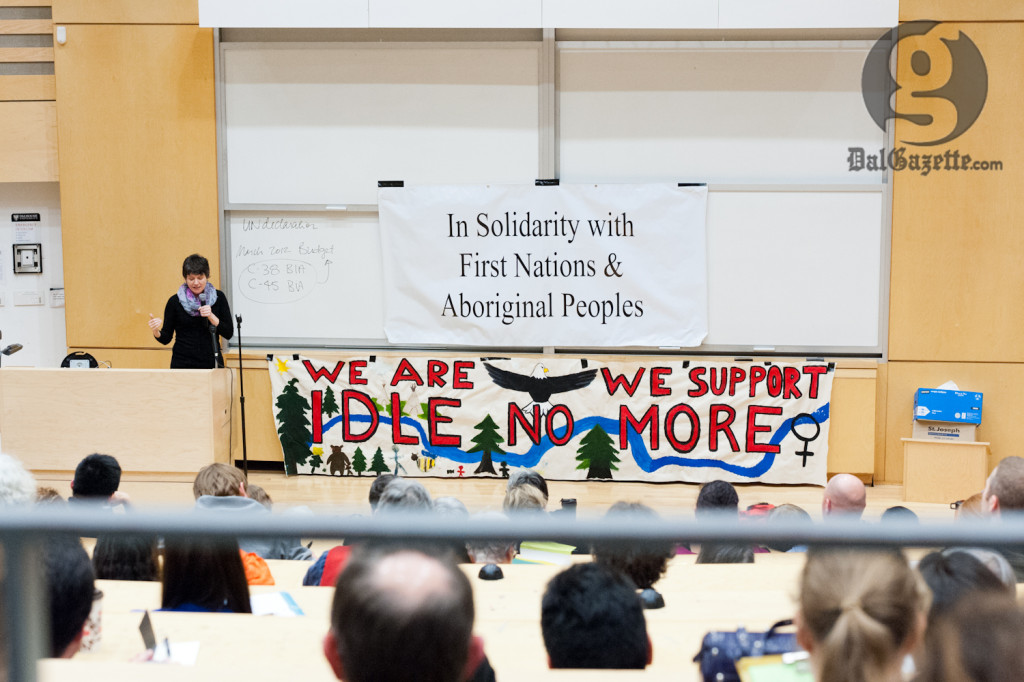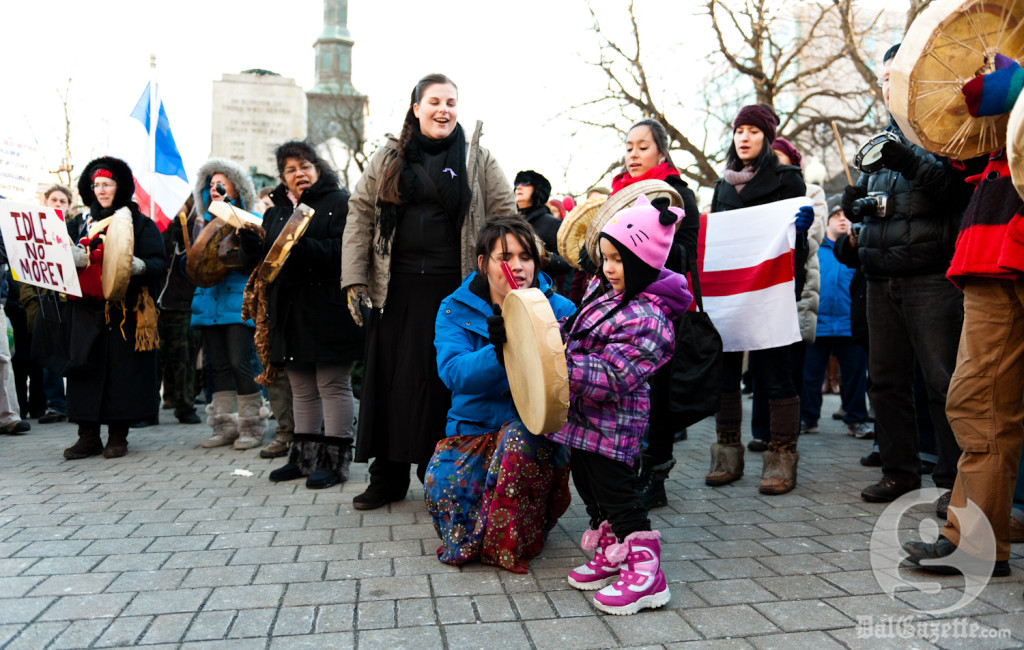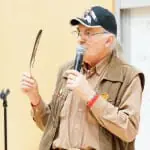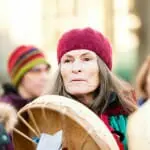
Walking into the Halifax World Trade and Convention Centre on a grey Sunday morning, Marina Young worried the turnout would be low. She was pleasantly surprised, when she arrived early, to see a handful of people already waiting for the Idle No More (INM) conference to begin.
When she wasn’t running around greeting newcomers, Young was sitting in the audience, in front of the panel of eight speakers and the podium beside it. Waving her hands or putting them together in a gesture of thanks, she tried to keep speakers on task.
“I was just making sure the room stayed calm,” says Young.
At the same time, she was trying to keep her four-year-old daughter, who is in many ways the inspiration for her involvement, occupied. It was, all things considered, an immense balancing act.
The room had just fallen silent for a serious prayer, but her daughter couldn’t stand to sit any longer. First she started to squirm, then cry and then—yell.
“I don’t want to be here!” she hollered.
No, Marina thought, Not now… The child, however, was determined. Heads started to turn, covert eyes glancing up, and still the prayer carried on. Giving in, Marina carried her daughter past the audience and into the hallway, hoping to calm her down.
About three other parents had brought their children that morning, caught, as Marina was, without daycare over the holidays.
“It kind of says a lot about, you know, women in the movement,” says Young. “There’s a lot of parenting, a lot of chaos.” But for many of the women involved, it’s a labour of love: a fight for their children’s future.
Begun by Sheelah Mclean, Nina Wilson, Sylvia McAdam and Jessica Gordon in Saskatchewan, INM Halifax is also being propelled by women. Three young women—sisters Shelley and Marina Young, along with Molly Jean Peters—have come forward as leaders of the INM movement in Nova Scotia.
Young is an arts student at Dalhousie and was recently elected president of the Dal Native Students Association (DNSA). She has dedicated much of her time with the movement to researching treaty history, and the effect that proposed legislation will take on those agreements.
“[Shelley and I] both realized that there’s a lot of history we have to try to cover within a really short amount of time,” Young says.
“The big neon sign above that, is that we should have already known our history.”
A student, a president and an activist, Marina also has a four-year-old daughter at home. Young says her motivation for this movement stems in large part from her daughter, who loves to sing Mi’kmaq songs.
Also involved in the movement is Erin Wunker, an English professor and head of the Canadian studies department at Dal. Wunker, a non-Aboriginal ally of the cause, participated in a four-day fast from Dec. 27 to 31 in solidarity with Chief Theresa Spence, along with roughly a hundred other fasters in Nova Scotia. She took water and kept to her house for the duration of the fast, her two dogs keeping her company while her partner was out of town.
Shelley Young, Marina’s sister, was fasting traditionally in Millbrook at the time, refraining from water and inaccessible by phone or Internet. Erin, who has taught Marina in some of her classes, wanted the sisters to know they had an ally in their professor, which motivated her to do the fast.
“It didn’t matter to me so much if anybody knew I was doing it,” says Erin. “It mattered to me that Shelley and her sister Marina … knew that I was doing it. I just wanted them to know that they had non-Aboriginal allies in positions of relative power,” Wunker says with a laugh. Marina and Shelley had invited Wunker to participate in the fast.
Wunker and Marina are remaining active in the movement into the winter term, having both been involved in the Solidarity Halifax teach-in held at Dal on Jan. 10.
Marina feels the reception of INM among the Halifax community has been positive. Proudly, she recounts the INM Halifax conference that took place Dec. 21, to correlate with the National Day of Action called upon by the broader INM movement. Labelled as an open discussion, participants ran the political gamut. MPs, activists, union leaders and concerned citizens were all present. The two Young sisters and Wunker worked constantly in the three days leading up to the event.
“We were frantic, calling everybody,” Marina says. “A lot of time spent on the computer, emails, contacting media, letting everybody know.”
Wunker approaches the movement in part through her involvement in Canadian Women In the Liberal Arts (CWILA), a group of about 300 women founded last spring. CWILA’s mission is to call attention to the shockingly low numbers of reviews of work by women in the liberal arts.
“CWILA came out with a very clear agenda to promote work by and about women, especially marginalized groups,” Wunker says. She sits on the board, and together with fellow CWILA member Jillian Gerome wrote an open letter to Prime Minister Stephen Harper, calling on him to address the growing INM movement. Members of CWILA could choose to add their digital signature if they wished to indicate their support.
“Jillian [Gerome] and I started talking about trying to leverage the fact that CWILA has more than 300 members to throw some heft behind a letter-writing campaign,” Wunker says. The letter has since been revised, and can be viewed on the CWILA website. It currently has about 280 signatures.
For Wunker, it is unsurprising that women seem to be spearheading this movement.
“In many First Nations communities, you’re coming out of a matriarchal culture. It’s women’s responsibility to care for the land, to care for the future,” she says.
Since Idle No More developed out of a response to Bill C-45, which reifies changes to the Navigable Waters Act, among others, it makes sense that women are emerging as leaders, says Erin.
Outside Halifax, First Nations women are taking charge, fighting for the rights of First Nations people in Canada. Cindy Blackstock, head of the First Nations Child and Caring Society of Canada, is a driving force behind an upcoming Human Rights Tribunal case against Canada. The case alleges that the government is discriminating against First Nations children by failing to provide as much funding for support services as it does for non- Aboriginal children. On Feb. 25, the case will go to trial and she will begin to learn whether Canada will be held accountable. The Vancouver Sun recently reported a gathering of hundreds of women and children at the Peach Arch border crossing in Vancouver in support of INM. Chief Theresa Spence has emerged as an obvious leader in the search for First Nations rights.
As INM continues to gain steam, women—alongside, and with the support of both men and women—continue to step up as leaders.












Recent Comments